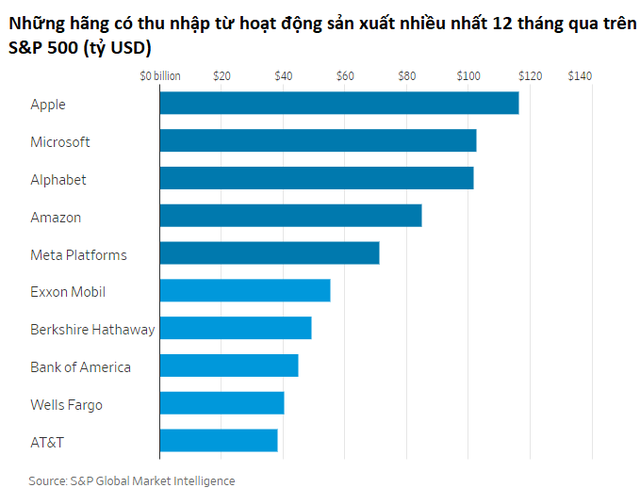The Dilemma of BigTech Companies: Too Rich to Spend

BigTech companies, such as Apple, Amazon, Microsoft, Alphabet (Google), and Meta (Facebook), are facing a unique problem caused by their immense wealth. These companies currently have a combined cash reserve of $570 billion, significantly surpassing the cash reserves of the five richest non-financial companies on the S&P 500 index. However, their wealth has become a burden as government scrutiny tightens.
Unlike other industries, BigTech companies primarily operate in the digital space, allowing them to avoid significant fixed costs and market volatility. This digital advantage has enabled companies like Alphabet, Microsoft, and Apple to generate over $100 billion in cash from their core business operations in the past year alone.
However, despite their vast cash reserves, BigTech companies are finding it increasingly challenging to spend their money. Due to their immense size and influence, governments, media, investors, and society meticulously monitor their every expenditure.
The significant impact that BigTech companies have on the market and the economy has led to increased scrutiny and intensified government control. This, coupled with growing public skepticism towards these wealthy giants, has posed new challenges for BigTech companies when it comes to spending their hard-earned cash.
Before the pandemic, BigTech companies had the freedom to engage in mergers and acquisitions (M&A) to expand their empires. However, the post-pandemic landscape has made it much more difficult for these companies to execute large-scale M&A deals. While BigTech companies like Amazon, Adobe, and Intel have managed to complete some M&A transactions, they have faced resistance and stricter regulatory oversight.
These challenges have resulted in longer deal completion times and increased efforts to navigate regulatory hurdles. For instance, Microsoft’s acquisition of Activision Blizzard took nearly two years to finalize, while previous large-scale M&A deals, such as LinkedIn’s acquisition in 2016, took less than six months.
Despite the obstacles, BigTech companies must continue pursuing M&A deals to stay competitive in this cutthroat industry. With rapid technological advancements and relentless expansion by their competitors, investors expect continuous innovation from these companies. Failing to engage in M&A activities could result in market decline, loss of market share, and lower stock prices.
A prime example of successful M&A strategy is Microsoft’s investment in OpenAI to develop ChatGPT, which propelled the company to become the world’s most valuable corporation, surpassing Apple. In contrast, Google faced criticism from shareholders for allowing Microsoft to gain an edge through artificial intelligence technology. Apple and Facebook have also faced shareholder pressure due to a lack of groundbreaking innovations in recent years.
Even though M&A activities come with risks and government intervention, BigTech companies like Google have no choice but to pursue these deals to continue their forward momentum. Google currently holds $98 billion in cash reserves, double that of Meta and significantly more than Apple’s $64.5 billion.
Furthermore, Google’s confidence in pursuing M&A deals has grown following Microsoft’s successful acquisition of Activision, demonstrating the feasibility of expansion through M&A.
Another BigTech giant, Apple, has taken a different approach. In response to increasing government scrutiny and pressure, Apple has been cautious in embracing large-scale M&A deals. Instead, the company has focused on returning capital to its shareholders, paying dividends of up to $15 billion in 2023.
Apple’s acquisition of Beats Electronics for $3 billion in 2014 remains the company’s largest M&A deal to date. However, Apple’s strategy of avoiding large-scale M&A deals and focusing on dividend payouts has helped alleviate concerns surrounding its spending habits and regulatory scrutiny.
For BigTech companies like Google, the dilemma of being too rich to spend is a real challenge. They must find a way to distribute their immense cash reserves among shareholders or take actions that appease the U.S. government. However, refraining from M&A activities risks falling behind competitors like Microsoft, who have demonstrated significant progress in the field of artificial intelligence.
The growing wealth and monopoly-like positions of BigTech companies, coupled with their lack of technological innovation, have raised concerns among policymakers and have made Apple particularly vulnerable to allegations of antitrust practices. As a result, Apple may have to open its App Store to external developers, a scenario that is gradually gaining support from the U.S. and European governments.
In conclusion, despite their immense wealth, BigTech companies find themselves in a unique dilemma. The challenges they face in spending their vast cash reserves highlight the complexities of their market presence and the need for careful strategic decisions. As these companies navigate increased government scrutiny, investor expectations, and evolving technological landscapes, their ability to effectively spend their wealth will significantly impact their long-term success.
Source: Business Today
